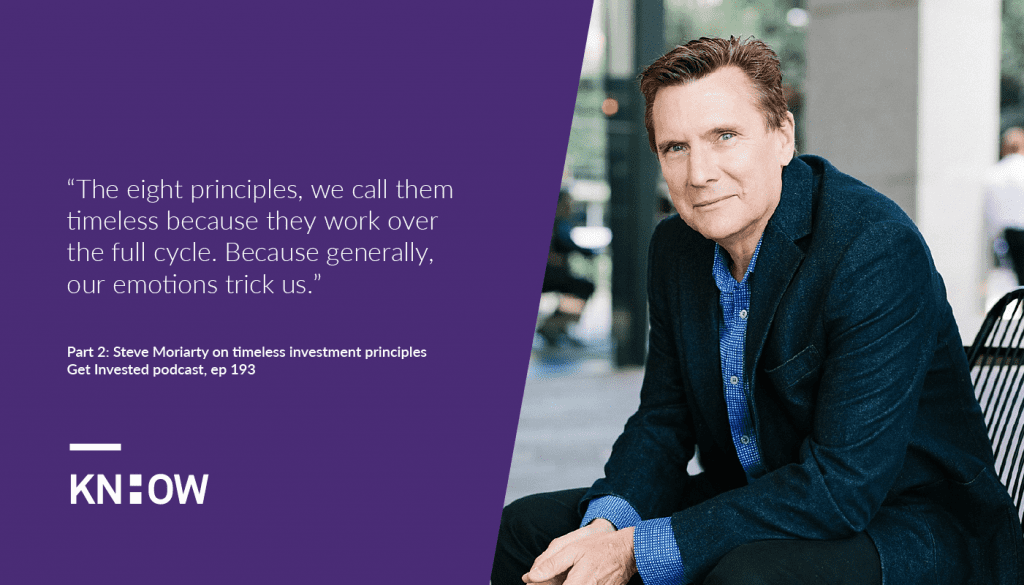Anyone can successfully build their wealth by applying eight timeless principles to their investing strategy, says investor Steve Moriarty.
One of the biggest downfalls of an investor will be their emotions. That’s why the most successful investors keep their strategies objective and systematic.
That’s where Steve Moriarty and his eight timeless principles come in. Steve has been a highly successful full-time private investor for over 20 years. During this time, and with extensive reading and research, he’s been able to develop these principles to provide structure to any investor’s journey, whether they’re interested in shares or property.
He joined KnowHow founder Bushy Martin on the Get Invested podcast to educate listeners on these principles.
“It’s a really important part of investing because the eight principles we use are not subjective, and generally our emotions trick us … and we call them timeless because they work over the full cycle,” Steve said.
“I’ve broken the principles into two parts because first of all, before you rush off and invest in anything, you need to have a think about these four principles. Then when you’ve thought about those four principles, then you say ‘ok now I’m actually going to buy a stock or buy a property’, and here’s what you should think about when you action them.”
Steve started off explaining the impact of systematic investing – the first principle.
“First of all, you say to yourself ‘am I investing systematically or am I investing because I’m bored?’ ” Steve said.
“It’s also about realising it’s not about you, it’s about the way the market works and if you know the cycles. I don’t care if you think the market’s going to go higher. At this point, there’s going to be a decline over the next 10 years because this is the way history has shown us. Is it different this time? Well, it could be, but you’re exposing yourself to a lot of risk. So you’ve got to have a system which is tried and tested.”
The next two steps are to consider the market cycles and prices.
“You can be the smartest guy in the room, but if you pay too much for an investment, you’re going to have a lower return. It’s as simple as that. So price is really important and knowing the market cycles,” Steve said.
Following this is the establishment of your risk hierarchy.
“The risk hierarchy is something I’ve developed over the years. The example I use is you go to a dinner party and you say to people, ‘I just bought a Woolworths’. And they go, ‘oh that’s interesting, let’s talk about it more’. But if you said instead ‘I just bought the Indonesian ETF’, people go ‘oh that’s interesting, anyway what’s for dessert?'” Steve explained.
“So it’s not very sexy, is it? Most people want to talk about sexy stuff rather than boring stuff, but the boring stuff will make you money and often have a much lower risk. So again, you want to think in a risk hierarchy sense about how you make money.”
Bushy added: “In all asset classes, a good investment is extremely boring. If it’s exciting, then you’re probably not making any money.”
Once investors have worked their way through these factors, Steve said the next step is to think about the four ‘thought’ principles, starting with ‘buy low, sell high’.
“That’s a no brainer, and we teach people when things are cheap and when they’re expensive. And again, we give them market knowledge to understand the cycles,” he said.
“So when something happens, people can not have an emotional response and instead say ‘yes, Steve told me this is what the market is like, so I can deal with it in a systematic way rather than an emotional way’.”
The next two thoughts are diversification and asset allocation, followed by rebalancing. With these principles, investors can particularly focus on being patient and successfully building wealth over the long term.
“With diversification and buy low, sell high, I’ll make more money over the cycle. Will you get rich tomorrow? I’ve got no idea, but I can tell you most people who get rich quickly give it back because they don’t know how they got rich in the first place,” Steve said.
“So the point there is to be patient because there are good times to invest and there are bad times to invest, but also bad times to have a lot of money in the market. Which means you say to yourself ‘is it a bad time? Yes? Ok, I should be prudent and rebalance’,” he said.
Listen to the full interview here.
Want to Know How you can build wealth with the help of leading, qualified experts? Talk to the team at KnowHow, now.




